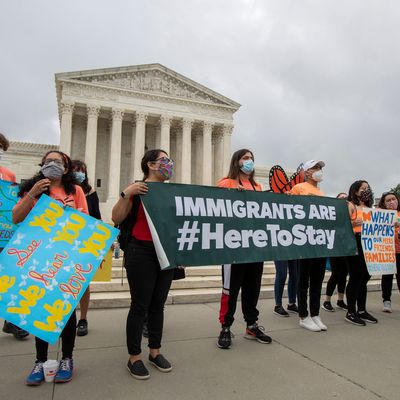
The long drive to enact comprehensive immigration-reform legislation, which has gone through more stops and starts than a city bus, has reached another crossroads. President Joe Biden has offered legislation to create a path to citizenship for roughly 11 million undocumented immigrants, and two smaller bills (one providing permanent relief for so-called Dreamers, and another giving seasonal farm workers a path to citizenship) have already passed the House. House Democrats are still tinkering with a comprehensive reform bill with the understanding that they can only afford to lose a handful of votes. And at present, there are no real prospects for enacting such legislation in the Senate via normal legislation. Even the steadily dwindling number of Republicans who are open to immigration reform (typically stigmatized as “amnesty” by hardcore conservatives even before Trump weaponized immigration policy) can be expected to use the current “border crisis” as an excuse to do nothing pending harsh enforcement measures against refugees.
So, unsurprisingly, immigration-reform proponents are hoping Biden’s legislation can be nestled into a budget-reconciliation bill that short-circuits the Senate filibuster. And Biden himself appears to have encouraged them, reports Politico:
President Joe Biden promised Hispanic lawmakers on Tuesday that he would make a more proactive case for the economic benefits of immigration.
In the process, he left the impression that it would not just be a portion of his upcoming address to a joint session of Congress, but that he’d support moving immigration measures through budget rules allowing a simple majority vote in the Senate.
That’s easier said than done, of course. It’s up to the Senate parliamentarian, not Joe Biden, to decide what can and cannot be included in a reconciliation bill, according to the Senate’s arcane Byrd Rule restrictions. And in the current Congress, the parliamentarian, Elizabeth MacDonough, has both given and taken away with respect to major Democratic initiatives. On the one hand, she agreed with Chuck Schumer’s contention that the Senate could take up two reconciliation bills per budget resolution (one has already passed for fiscal year 2021, and a budget resolution for fiscal year 2022 can be passed soon), which gives Democrats the flexibility to mix and match provisions in the manner best suited for enactment. On the other hand, her interpretation of the Byrd Rule excluded a $15-minimum-wage provision from the American Rescue Plan before it cleared the Senate last month.
Her precise ruling was that while the $15 wage would have significant impact on federal revenues and spending (a Byrd Rule requirement), such impact was “incidental” to its basic purpose (a Byrd Rule prohibition). A comprehensive immigration-reform bill could fall prey to the same reasoning, but Hispanic Caucus members hope otherwise, notes Politico, particularly if Biden supports claims that “a pathway to citizenship for undocumented people [would be] a $1.4 trillion boon for the U.S. economy” in his April 28 speech to a joint session of Congress. Caucus chair Raul Ruiz is convinced Biden is committed to getting reform “done once and for all” by whatever means necessary, even though the next reconciliation bill has been widely advertised as focusing on infrastructure improvements and making some American Rescue Plan provisions permanent.
But as was the case with the $15 minimum wage, the Byrd Rule is just part of the problem. Even using reconciliation, the bill would need 50 Senate votes, after such modifications as are necessary to get it through the House. Is Joe Manchin on board with the idea of enacting a reform bill over the angry objections of Republicans? Yes, he supports comprehensive reform, as Forbes noted recently:
Manchin has repeatedly pointed to a 2013 immigration bill adding 40,000 border patrol agents and creating a pathway to citizenship for many undocumented immigrants as the ideal version of an immigration bill. That bill passed the Senate 68-32 but was not considered by the House, which was then controlled by Republicans.
But Manchin has also echoed perpetual GOP demands that border security be enhanced first, which has been the great excuse for doing nothing all along. And the West Virginian has also regularly talked of bipartisanship as an end in itself in enacting major legislation. We’re a long way from the days when leading Senate Republicans like Lindsey Graham and Marco Rubio could be counted on to support comprehensive immigration reform against the wishes of their party’s nativist base. Asked last month if he’d support a vote on the Dreamer path-to-citizenship bill he had just helped introduce, Graham said: “God, no … I’m not in support of legalizing one person until you’re in control of the border.”
Soon, you may be able to add immigration-reform advocates to the ranks of those so frustrated with the Senate that they support zapping the filibuster once and for all.






























